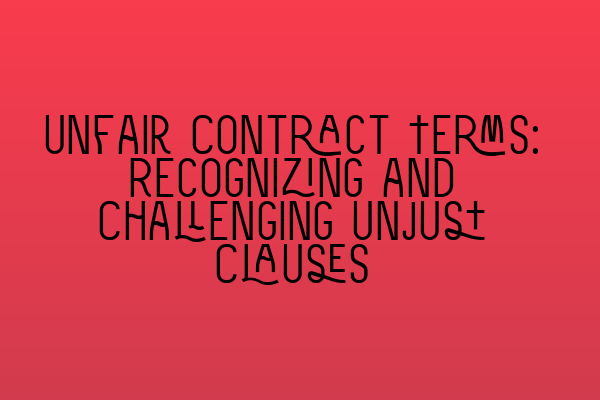Unfair Contract Terms: Recognizing and Challenging Unjust Clauses
As a solicitor specializing in contract law, it is important to recognize the impact that unfair contract terms can have on individuals and businesses. Unjust clauses within contracts can lead to significant disadvantages, causing financial and legal complications. It is crucial for both solicitors and clients to understand how to identify and challenge these unfair terms.
Under the Consumer Rights Act 2015, unfair terms in consumer contracts are not legally binding. This legislation ensures that consumers are protected from terms that may not be in their best interest. However, identifying unfair terms requires a comprehensive understanding of contract law.
One of the key aspects of an unfair contract term is that it creates a significant imbalance in the rights and obligations of the parties involved. This inequality can be due to a variety of factors, such as:
1. Lack of transparency: Unfair terms are often hidden within convoluted language or buried deep within the contract. This lack of transparency makes it difficult for individuals to fully comprehend the terms they are agreeing to.
2. Excessive financial burdens: Unjust clauses can impose unreasonable financial obligations on one party, putting them at a severe disadvantage. These obligations may include excessive cancellation fees, penalties, or one-sided indemnity clauses.
3. Unilateral changes: Contracts that grant one party the power to unilaterally modify the terms without the consent of the other party are often considered unfair. This can lead to unpredictability, loss of control, and imbalance in bargaining power.
4. Unreasonably limiting liability: Unfair terms may seek to limit or exclude liability for one party, even in cases where such limitations are unreasonable or unfair. For example, a contract that absolves a service provider of all liability for negligence would likely be deemed unfair.
Challenging unfair contract terms requires a proactive approach. If you come across such terms in a client’s contract, it is essential to act swiftly. Here’s how you can approach the situation effectively:
1. Thoroughly review the contract: Carefully examine the contract to identify any potentially unfair terms. Take note of obscure language, terms that are heavily biased towards one party, or clauses that seem excessively burdensome.
2. Consult your client: Discuss the identified unfair terms with your client and explain the potential consequences. Ensure that they understand the implications and are willing to challenge these terms.
3. Research relevant case law: Familiarize yourself with past cases involving unfair contract terms. This will bolster your argument when challenging the terms, and help you provide legal precedent to support your client’s claim.
4. Communicate with the opposing party: Reach out to the other party involved in the contract and highlight your concerns regarding the unfair terms. Attempt to negotiate a fair resolution before resorting to legal action.
5. Seek legal remedies: If negotiation fails, consider taking legal action to challenge the unfair terms. This may involve filing a claim with the relevant court or alternative dispute resolution (ADR) methods, such as mediation or arbitration.
As an SEO expert, I understand the importance of integrating relevant keywords to ensure visibility and reach. However, it is equally crucial to maintain a professional tone and provide valuable information to readers. If you found this article helpful, you may be interested in exploring our related articles on SQE contract law preparation:
– SQE 1 Practice Exam Questions
– SQE 1 Practice Mocks FLK1 FLK2
– SQE 2 Preparation Courses
– SQE 1 Preparation Courses
– SRA SQE Exam Dates
Remember, recognizing and challenging unfair contract terms is essential to protecting the rights and interests of your clients. Keep yourself updated on the latest developments in contract law, and always prioritize fairness and justice in your practice.
